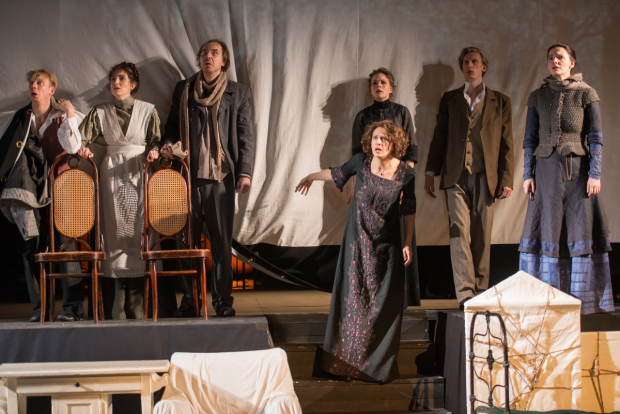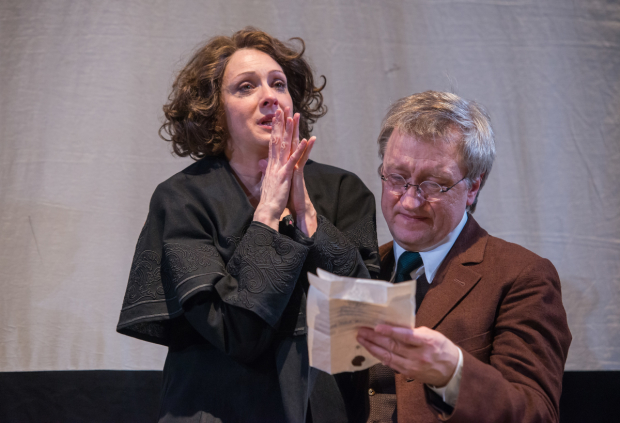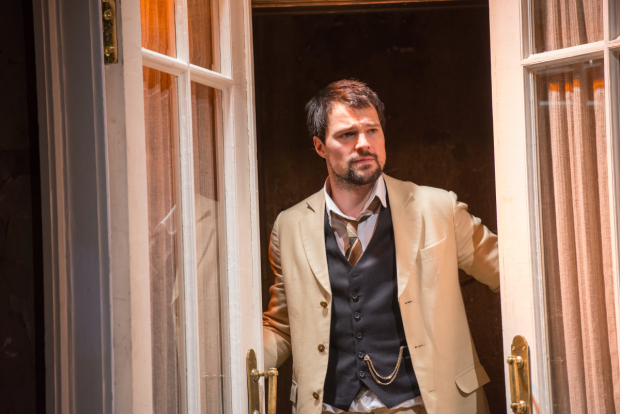The Cherry Orchard

(© Stephanie Berger)
Rapid social transformation, growing malaise, and an elite stubbornly slouching into its own demise: It is amazing how much the circumstances of Anton Chekov's The Cherry Orchard resonate with our own time. Originally produced by the Moscow Art Theatre in 1904, the perennial classic is now receiving a superb revival from Maly Drama Theatre of St. Petersburg, whose latest stop is BAM's Harvey Theater. This is a rare opportunity to see Chekhov's final masterpiece performed in Russian (with English supertitles) by a cast of first-rate actors.
The story follows Lyubov Ranevskaya (Ksenia Rappoport), a widowed Russian landowner. After a long self-imposed exile in Paris, she has finally returned home to her family's beloved cherry orchard. Her brother, Gayev (an appropriately frustrating and self-important Igor Chernevich), and her daughter, Anya (Danna Abyzova), have returned as well. The help is in tow: manservant Yasha (a sleazy Stanislav Nikolskii) and raving mad governess Charlotta (Tatiana Shestakova, performing a captivating one-woman horror show). Ranevskaya left her adopted daughter, Varya (Elizaveta Boiarskaia) in charge of the estate, with the help of lovesick clerk Yepikhodov (a wiry yet powerful Andrei Kondratiev) and ancient servant Firs (a clownish Sergei Kuryshev). Unfortunately, they cannot even pay the mortgage interest, and the orchard is set to be sold at auction by the end of summer.

(© Stephanie Berger)
Wealthy local businessman Yermolai Lopakhin (Danila Kozlovskiy) offers a plan to avert disaster: Chop up the massive estate and rent little parcels as summer cottages. Although this would provide a steady income, Ranevskaya and Gayev find the idea terribly pedestrian, especially coming from someone as low-born as Lopakhin. "My father was your grandfather's serf," he says to Ranevskaya, "but you once did so much for me that I've forgotten all that and love you like one of my own." He also covets her as a bride, perhaps as a result of his own internalized classism. Still, he has the cash and she has the name: It's a perfect arrangement, right? Not quite.
Director Lev Dodin is judicious in his adaptation, hacking through the weeds to get us right into this conflict of class, pride, and economic reality (the character of neighboring landlord, Boris Simeonov-Pishchik, has been eliminated completely). The result is a production with the breezy pace of a comedy, but the emotional heft of a tragedy. It perfectly encapsulates the dueling impulses of this famously contentious play (Konstantin Stanislavsky directed the original in his typically maudlin style, leading Chekhov to accuse the father of modern acting of ruining his "comedy"). The innate extremes of the work are at harmony here: Nothing feels superfluous in performance or design.
Dodin and designer Aleksander Borovsky beautifully employ the Harvey Theater (a crumbling palace in its own right) to represent the manor house. The actors enter from the upper orchestra, utilizing the two aisles like a massive double staircase. Ranevskaya surveys the giant cracked walls far upstage, appearing like Jack in the giant's castle. Once we have taken in the full enormity, Dodin smartly cuts the space in half with a projection screen hanging from the proscenium, forcing the action into the house (like the antique furniture onstage, every seat is covered in linen to ward off dust). For the next three hours, we share a home with these unhappy Russians.
As Varya, Boiarskaia wears a headscarf and a scowl. Like Little Edie of Grey Gardens, she appears exhausted by her life in this magnificent dump. We sympathize with her and her impossible situation. The adopted (and therefore, less valued) daughter, she cannot afford the bracing nostalgia so ravenously consumed by Ranevskaya. The ageless Rappoport plays the lady of the house with a bipolar mix of wistful romanticism and bitter resignation. She seems to be constantly clutching a coffee cup and shrugging her shoulders, especially as her not-so-secret admirer assaults her with salvation.

(© Stephanie Berger)
Kozlovskiy is unforgettable as that would-be bourgeois savior. His Lopakhin is sexy and charismatic, the very definition of Russian manhood. "Dacha! Dacha! Dacha!" exclaims the consummate businessman as he jabs the air with his hands, imagining the rental cottages that will save this family from financial ruin. The audience is ready to sign on; the fact that Ranevskaya and her clan can so easily ignore him is a testament to the power of their entrenched class prejudice. His victory lap, when he finally takes control of the estate, is more gleeful than any Oscar acceptance speech or Super Bowl touchdown. Pure adrenaline emanates from his muscular frame as he dances up and down the grand staircase in triumph. As if this were not over-the-top enough, he caps it all (perhaps for the benefit of us Yanks) with a chorus of "My Way" à la Frank Sinatra (featuring a convincing American accent). Registering one of the most physically and emotionally committed performances I've seen onstage, Kozlovskiy is a sweaty marvel.
The unadulterated commitment of the entire cast leaves the most lasting impression: At key moments, the players massacre each other with their eyes. Their tragedies often transcend into high comedy, made more hilarious by the characters never being in on the joke, even as they continually break through the fourth wall and confront us directly. Chekhov's text comes alive under the production of Maly Drama Theatre, something English-speaking troupes would be wise to replicate when tackling our own classics.










